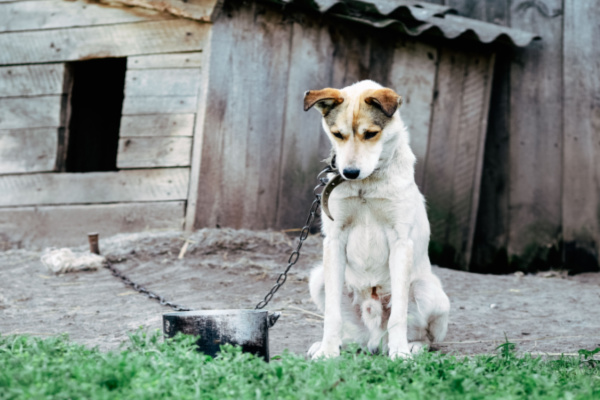While most of us keep our dogs indoors and consider them to be members of our families, and wouldn’t dream of having it any other way, that sadly isn’t the case everywhere. Countless other dogs are left to languish at the end of a chain or tether, without consistent access to food and water, are denied veterinary care, and are never given opportunities to socialize or engage in healthy behaviors. Some may spend their entire lives that way, and be left so long without attention that their collars become painfully embedded in their necks as their bodies grow to adulthood.
Not only is this practice cruel, and incredibly dangerous for dogs who can become entangled and killed, it’s putting community safety at risk. Dogs are naturally social and physically active animals. The isolation they endure when continuously tethered creates dogs that are lonely, bored and anxious. Most of them eventually become territorial and aggressive. Research has shown that chained dogs are at a greater risk of biting people than dogs that don’t live a chained life. Ordinances that restrict chaining are beneficial to both dogs and people.
Many communities have taken action to address this by banning or restricting tethering — as of last year, it was estimated that 23 states had laws that ban or restrict tethering — but there’s still a long way to go to change hearts and minds about how we treat dogs and much work to do before we see this ended across the U.S.
Have a Heart for Chained Dogs Week is observed every year from February 7 through Valentine’s Day. The week was started by the national organization Dogs Deserve Better, a group that advocates for and rescues chained dogs. Their goal is to stop the constant chaining of dogs. While they work towards this end all year long, the week around Valentine’s Day is one of their most prominent periods of activity.
Here are some of the activities that Dogs Deserve Better perform in their quest to improve the lives of chained or penned dogs.
- Meet with the caretakers of dogs that are chained or penned up outside to advocate for the dog and discuss alternatives open to them
- Provide fencing grants to those willing to bring their dog inside but can’t afford to put up a fence to keep their dog safe
- Award Hero Grants to assist individuals and non-profit rescues with the cost of routine vet care and spay/neuter costs for formerly penned or chained dogs
During Valentine’s week, volunteers sends handmade Valentine’s Day cards to the owners of continuously chained dogs. Each Valentine is signed from their dog and includes a brochure that explains why keeping a dog chained up all the time is a form of abuse. They include a coupon for dog food or treats. Their goal is to educate people (rather than accuse them of wrongdoing) so they will consider either bringing their dog in the house as a family member or find a better home for the dog.
—
Photo Credit: DreamHack / Shutterstock.com
